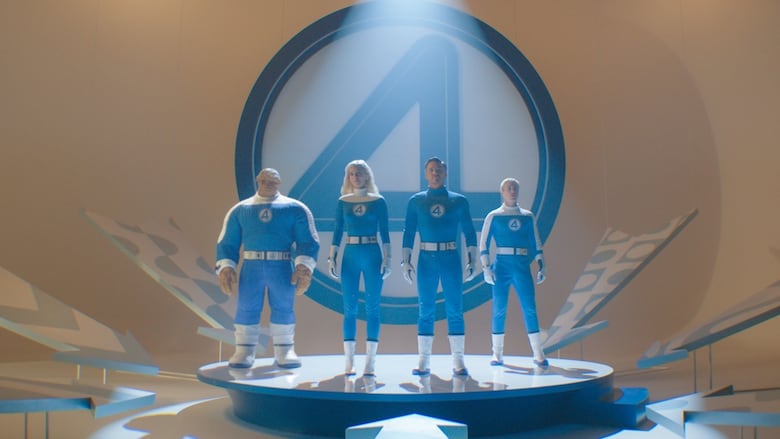Fantastic Four focuses on fun
The group chat delves into the newest instalment of the Marvel film

The Fantastic Four: First Steps comes out in theatres today. The reboot of Marvel's superhero group takes place in a futuristic 1960s America, giving it a nostalgic aesthetic that roots itself in the original vision of the comic books.
Today on Commotion, guest host Eli Glasner speaks with NPR's TV critic Eric Deggans, entertainment reporter Teri Hart and Mashable entertainment editor Kristy Puchko about their thoughts on The Fantastic Four and if it can reverse Marvel's recent slump at the box office.
We've included some highlights below, edited for length and clarity. For the full discussion on remembering both The Cosby Show's Malcolm-Jamal Warner and wrestling icon Hulk Hogan, listen and follow Commotion with Elamin Abdelmahmoud on your favourite podcast player.
Eli: Teri, what's the vision behind this new take on the Fantastic Four?
Teri: What people are seeing in this very, very significant media buy that Disney has put behind this movie is a restart for the MCU [Marvel Cinematic Universe]. It's like, we are done with the Avengers, we are done with those old characters and we are in a new universe for the MCU — and that universe is the Fantastic Four.
It's a really fun movie to watch. I quite liked the movie…. What's nice about this movie is it doesn't wind around itself 16 times, the way so many MCU movies do. It's like, they [the Fantastic Four] went to space, something happened, they have superpowers, let's move on — and then we get going. All the exposition that we were getting into and all of the explainers and all of the different lore in the MCU was tiresome, let's be clear. And this does not have that. So it's fun and it's a summer blockbuster and it's squarely in that territory, and I think it delivers.
Eli: This is just the latest of The Fantastic Four movies. There was the 2005 version with Chris Evans and Jessica Alba, the 2015 version with Michael B. Jordan and Miles Teller. Eric, talk to us about The Fantastic Four as just a story and a Marvel entity and what makes it — up until now, perhaps — so hard to adapt.
Eric: The Fantastic Four were the building blocks for Marvel. They were the first set of heroes to come along to present Marvel's vision of: these are heroes that operate in a reality. They're not in a metropolis or some made-up city, they're in Manhattan. They operate out of a skyscraper in the middle of New York City. They deal with real landmarks and real people. And they were a family with real tensions. And I think one of the things that was hard about adapting this though, is that so much of it was very cosmic, and so many of their villains were really exaggerated. Galactus is a perfect example: a world-eating giant from outside our solar system.
I think a lot of The Fantastic Four movies, where they fell down, were figuring out who the villain could be. It wasn't Galactus in many of them. And if that villain is not Galactus, you've already lost fans of the Fantastic Four because they want to see that classic match-up that defined the Fantastic Four. So it was great that they tackled portraying Galactus the way he is in the comic books [as the villain].
Eli: Let's talk about aesthetic, Kristy. I would describe The Fantastic Four as Norman Rockwell meets The Jetsons: this wonderful vision of the future, by way of the 1960s. So it has a look. It has very interesting aesthetic choices. Do you think that was crucial to the story?
Kristy: I do. Here's the thing: I think that we got into kind of a rut where superhero movies became such a formula because it was working for DC [DC Comics] and MCU for a while that they're like, "These are how these movies look." And the genre might change up a little bit, but they had the consistent look. I think by being like, "We're doing a different look," it says, "We're doing something new, let's reset."
I've seen all the other Fantastic Four movies and I will be honest, I don't remember a lot about them. And I think that's in part because it's hard in this superhero genre that we have developed as an industry, as a society, to make sense of four people that are like, "We wear matching spandex, we're called the Fantastic Four." We haven't allowed for that in any kind of real way.
So they have to embrace the kitschiness of it. And putting it in the '60s, it gives it that Incredibles vibe, where we are allowed to have an idealistic nostalgia of an aesthetic instead of dealing with the reality of the '60s — and notably their 1960s looks very different than our 1960s in a political structure. But aesthetically? Gorgeous, love it. It really does allow us an escapism that I think Marvel got stuck in with all these gritty, "And now here's Yelena [Black Widow], but she's sad." It allows us to be like, "Hey guys, remember when things were just fun and super?"
You can listen to the full discussion from today's show on CBC Listen or on our podcast, Commotion with Elamin Abdelmahmoud, available wherever you get your podcasts.
Panel produced by Stuart Berman.

